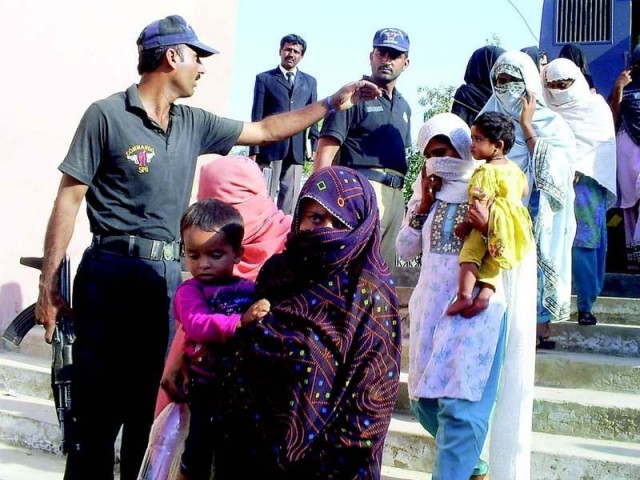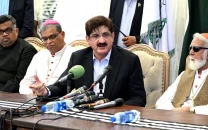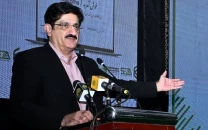Contractual employment: Over 70 health workers return still hoping for success
The workers praised political leaders for helping them through their struggle.

There was palpable relief amongst the 70-odd Lady Health Workers (LHWs) who returned to Karachi after what they described as “brutal torture” by the police.
On Wednesday, scores of women were rounded up by the police for blocking the National Highway near the Sindh-Punjab border.
However, while the police said they had disrupted traffic, LHWs said their vehicles had been “hijacked” by the police, who forced them to stop on the highway. “We were just going to Ghotki to get our demands met and the police did this to us,” said Zaitoon. Flower petals were showered on those who had returned ‘victorious’ from their battle, which saw 30 health workers thrown into jail and hundreds baton-charged.
In particular, the efforts of Pakistan Muslim League - Quaid MNA Marvi Memon were praised. “She was with us throughout, she is our sister”. The LHWs took care, however, to mention every political leader. “We were freed because Uzair bhai lobbied the government,” said Nusrat, referring to Uzair Baloch, the head of the now-defunct Peoples Amn Committee. Others praised President Asif Ali Zardari, Home Minister Zulfiqar Mirza, Chief Minister Qaim Ali Shah and Muttahida Qaumi Movement chief Altaf Hussain.
Upon their arrival, the LHWs were ushered into Taj Medical Complex to address the people but several workers seemed ready to go home after spending several gruelling days on the road.
While the Ghotki police came in for a great deal of censure for having baton-charged and ‘shelled’ the protesters, others, such as Zaitoon, praised them for arranging transportation to take them back to Karachi.
Memon wrote on the microblogging website Twitter that it was “the worst police brutality I have witnessed in three years”. According to Memon, she took refuge in a resident’s hut along with the LHW association’s head, Bushra Arain, and 60 other workers.
Health worker Sajida Shah said that, “Our families are relieved to see us. So many women here are widowed or are the sole earners of their family.” She added that, “We could not contact our children when we were there since our phones were shut off”.
“Our demand is that we should be made regular employees,” explained Zakia Khanum, as women around her wiped away tears of joy and relief. “We had been told by our supervisors that we would be made permanent employees but we had no choice left but to protest. We had no idea that we would be ‘hijacked’ by the police and then beaten up. They snatched our purses too.”
The Supreme Court directed the government in February to increase the salaries of LHWs from Rs3,200 to Rs7,000. In its ruling, the court stated: “We expect that enhancement of their emoluments to the extent of minimum wages of Rs7,000 per month shall be reconsidered for the purpose of making it rational and also to create distinction between the supervisory staff, accounts staff and the field staff, depending upon the nature of their duties, as early as possible.”
Later, salaries were increased but the contractual employees continued to rankle. LHWs hope that their demands will now be met.
“We do not get health benefits,” one of the workers pointed out. “We have taught women in the villages good health practices yet we are not entitled to receive treatment. Without LHWs, there will be no end to polio!”
“Thirty of our colleagues are still in jail,” said Shah. “Until they are released we will continue to protest.”
The protest by these LHWs demanding permanent employment adds to the numerous labour protests that have happened this year. In January, thousands of Karachi Electric Supply Company (KESC) workers, who had been laid off, protested and allegedly attacked the KESC office. The Sindh Professors and Lecturers Association’s march to the Chief Minister House turned ugly when the protesters were tear-gassed. Last month, the Federal Government Teachers Association went on a strike in Islamabad and called off their protests when the government agreed to their demands.
“This is a democracy,” said Shah. “We have the right to protest peacefully. We have become aware of our rights, especially once we made an association. Our leader Bushra Arain encouraged us and helped us realise that we cannot just keep earning daily wages.”
Published in The Express Tribune, March 26th, 2011.



















COMMENTS
Comments are moderated and generally will be posted if they are on-topic and not abusive.
For more information, please see our Comments FAQ